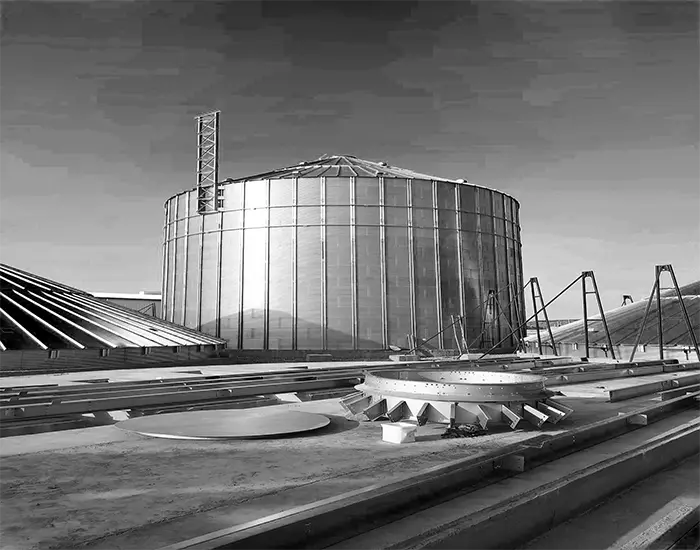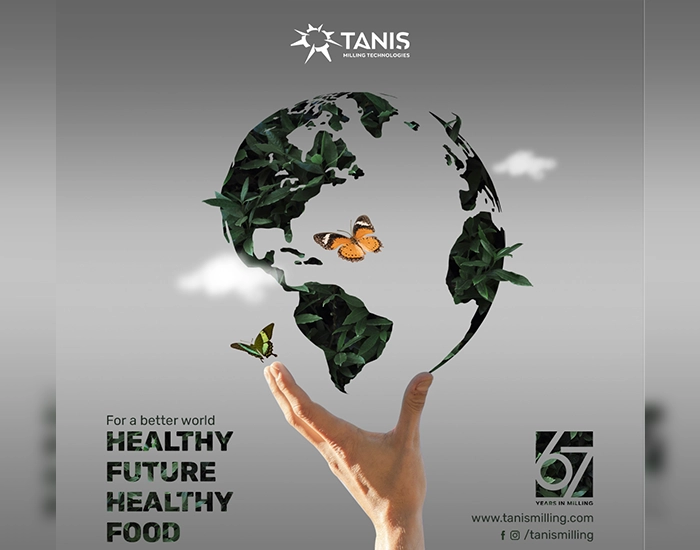As Tanış A.Ş., we are conscious of our environmental responsibility while manufacturing mill machinery and industrial equipment. We consider our responsibility for protecting natural resources and leaving a livable world for future generations as an integral part of our corporate citizenship understanding. Our environmental projects are designed to contribute to a sustainable future, reduce our carbon footprint, and protect natural resources. On this page, you can find information about our environmental vision, sustainability projects we conduct, and our efforts to minimize our environmental impact.
Our Sustainability Policy
As Tanış A.Ş., our sustainability policy is built on minimizing our environmental impacts, using natural resources efficiently, and developing environmentally friendly production methods. Our sustainability strategy is aligned with the United Nations Sustainable Development Goals and specifically aims to contribute to the goals of “Responsible Production and Consumption,” “Climate Action,” and “Industry, Innovation and Infrastructure.” Our senior management supports our environmental sustainability commitment and provides the necessary resources. In our organizational structure, the Sustainability Committee coordinates these efforts.
With the awareness of our responsibility in combating climate change, we adopt a systematic approach to reduce our carbon footprint. In accordance with Greenhouse Gas Protocol standards, we measure, report, and develop reduction strategies for our direct and indirect emissions. We aim to reduce our carbon emissions by 50% by 2030 and achieve net zero emissions by 2050. These targets are aligned with Science Based Targets and support the Paris Agreement’s goal of limiting global warming to 1.5°C.
Efficient use of natural resources such as water, energy, and raw materials is one of the fundamental elements of our sustainability approach. We use closed-loop systems and water recovery technologies to reduce our water consumption. In raw material usage, we prevent waste and reduce scrap rates through design optimization and precision production techniques. In our waste management, we apply the principle of “Reduce First, Then Reuse, Finally Recycle.” We reduce our fossil fuel consumption through energy efficiency projects and renewable energy investments.
As holders of the ISO 14001 Environmental Management System certificate, we systematically manage our environmental impacts. Environmental dimensions and impacts of all our activities are evaluated, and control measures are developed for significant environmental impacts. We control and continuously improve the effectiveness of our environmental management system through regular internal and external audits. We measure our environmental performance with indicators such as energy consumption, water usage, waste amount, recycling rate, and emissions, and report periodically.
Our “Green Factory” Project
Our “Green Factory” project was launched in 2019 to minimize environmental impacts at our production facility and implement sustainable production practices. In this context, we invested in technologies such as energy-efficient lighting systems, high-efficiency motors, and heat recovery systems, reducing our energy consumption by 25%. We reduced our water consumption by 30% by installing closed-loop cooling systems and rainwater collection systems for water conservation. We created recycling stations at our production site to ensure waste separation at the source. Additionally, we supported biodiversity by conducting landscaping work in a 5,000 m² area around the factory.
Our “Zero Waste” initiative is implemented to minimize waste generated in our production processes and ensure that waste is recycled or reused as much as possible. By conducting optimization studies in production processes, we reduced scrap rates by 40%. We established waste separation systems in our office and production areas to ensure separate collection of recyclable waste. We created special collection systems for metal waste, paper, plastic, and other recyclable materials. We increased awareness by providing regular waste management training to our employees. Thanks to this initiative, we increased our recycling rate to over 75% and reduced the amount of waste sent to landfills by 60%.
Our “Clean Water” Project
Within the scope of our “Clean Water” project, launched for the protection and efficient use of water resources, we use advanced technologies for the recovery and treatment of water used in production processes. By establishing an advanced wastewater treatment plant at our production facility, we recover and reuse 80% of the water used in the process. Additionally, we collaborate with local governments to contribute to the protection of local water resources in the region where our facility is located. With water conservation measures and efficiency-enhancing projects, we managed to reduce our water consumption per unit production by 35% over the past three years.
“Green Energy” Transformation
We implemented our “Green Energy” transformation program to reduce environmental impacts from our energy consumption. The 500 kW solar energy system installed on our factory roof meets 20% of our annual electricity needs. With energy efficiency projects, we reduced our energy consumption per unit production by 28% over the past five years. Our investments in technologies such as high-efficiency motors, frequency converters, and thermal insulation improvements have significantly contributed to energy savings. Through this transformation, we reduced our annual carbon emissions by 1,200 tons of CO2 equivalent.
“Yeşil Yarınlar” Ağaçlandırma Programı
“Yeşil Yarınlar” ağaçlandırma programımız, 2018 yılından bu yana yerel ekosistemleri desteklemek ve karbon emisyonlarını dengelemek amacıyla yürütülmektedir. Her yıl, tesisimizin bulunduğu bölgede ve işbirliği yaptığımız belediyelerin belirlediği alanlarda ağaçlandırma çalışmaları gerçekleştiriyoruz. Ağaçlandırma faaliyetlerimizde, yerel ekosisteme uygun, su tüketimi düşük ve bölgenin iklim koşullarına dayanıklı ağaç türleri seçilmektedir. Çalışanlarımız ve ailelerinin gönüllü katılımıyla gerçekleştirdiğimiz bu program kapsamında, bugüne kadar 20.000’den fazla ağaç dikilmiştir. Dikilen ağaçların bakımı ve korunması için yerel yönetimlerle işbirliği yapıyor, düzenli izleme çalışmaları yürütüyoruz.
Çevre Eğitim Programlarımız
Çevre bilincinin yaygınlaştırılması ve gelecek nesillerin sürdürülebilirlik konusunda bilinçlendirilmesi amacıyla, yerel okullarda çevre eğitim programları düzenliyoruz. “Çevre Dostu Küçük Eller” projemiz kapsamında, ilkokul ve ortaokul öğrencilerine yönelik interaktif eğitimler, atölye çalışmaları ve saha gezileri organize ediyoruz. Eğitim programlarımızda, su tasarrufu, enerji verimliliği, atık yönetimi ve biyoçeşitlilik konuları ele alınmaktadır. Ayrıca, öğretmenler için eğitici eğitimleri düzenleyerek, çevre eğitiminin sürekliliğini sağlıyoruz. Son üç yılda, 50’den fazla okulda 10.000’in üzerinde öğrenciye ulaştık.

Community-Based Environmental Projects
“Green Futures” Afforestation Program
Our “Green Futures” afforestation program has been conducted since 2018 to support local ecosystems and offset carbon emissions. Every year, we carry out afforestation activities in the region where our facility is located and in areas designated by the municipalities we collaborate with. In our afforestation activities, tree species suitable for the local ecosystem, with low water consumption and resistant to the region’s climate conditions are selected. Within this program, carried out with the voluntary participation of our employees and their families, more than 20,000 trees have been planted to date. We collaborate with local governments for the care and protection of planted trees and conduct regular monitoring studies.
Our Environmental Education Programs
To spread environmental awareness and raise awareness among future generations about sustainability, we organize environmental education programs in local schools. Within the scope of our “Environmentally Friendly Little Hands” project, we organize interactive training, workshop activities, and field trips for primary and secondary school students. Our education programs cover topics such as water conservation, energy efficiency, waste management, and biodiversity. Additionally, we organize training for trainers for teachers, ensuring the continuity of environmental education. In the past three years, we have reached over 10,000 students in more than 50 schools.
Sustainability in the Supply Chain
Our Green Procurement Policy
We implement our “Green Procurement” policy to spread sustainability principles throughout our supply chain. In supplier selection, criteria such as environmental performance, ISO 14001 certification, and sustainability practices are included in our evaluation process. We work closely with our suppliers to ensure that raw materials are sourced from sustainable sources and environmental impacts are minimized. We regularly evaluate our suppliers’ environmental performance and implement development programs. 60% of our suppliers have environmental management system certification, and we aim to increase this rate to 80% by 2025.
Our Circular Economy Applications
By adopting circular economy principles, we strive to minimize the environmental impacts of our products throughout their life cycle. From the design stage, the energy efficiency, material usage, and recyclability of our products are taken into consideration. We develop innovative solutions for the evaluation of by-products and waste generated in production processes. We contribute to the circular economy through applications such as recycling metal chips, reusing packaging materials, and recovering waste heat. We continue to reduce the environmental footprint of our products with sustainable material research and eco-design applications.

